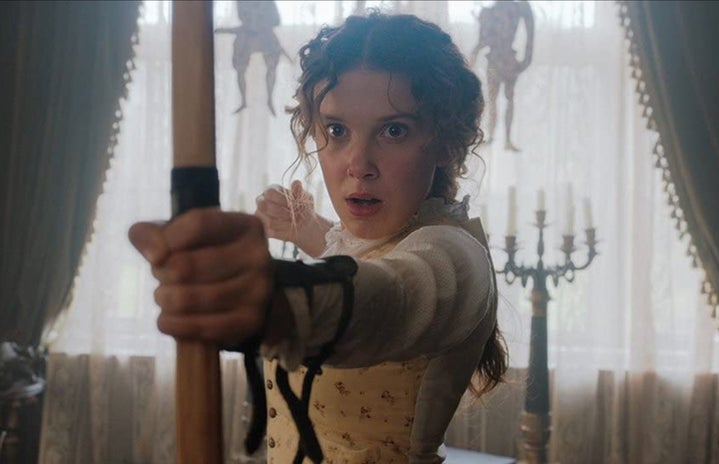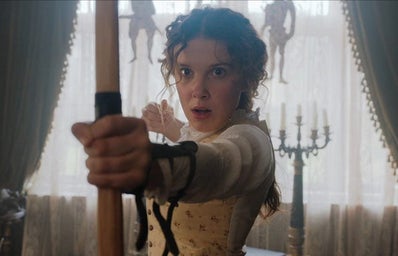*Warning: Spoilers Ahead!*
Netflix’s Enola Holmes combines action, adventure, mystery, and love through the seeps of family drama. A feel-good movie for a weekend at home, it is exactly what’s needed this autumn when most people can’t go to public theaters.
Right off the bat, an impressive cast list is introduced through trailers and advertisements. A cast line up of Sam Claflin, Henry Cavill, and none other than Millie Bobby Brown and Helena Bonham Carter as leads. The plot contains traditional elements of a coming of age movie, an absent father, and a determined adolescent daughter.
In the traditional Sherlock Holmes novels by Arthur Conan Doyle, Sherlock Holmes and his partner in crime, Dr. John Watson, are the main characters. In this film adaptation, however, the movie centers around Enola Holmes, Sherlock and Mycroft’s sister, and her journey into the world of adulthood. Through a teenage girl’s perspective, the writers and director capture the essence of London’s social class and gender expectations of the late 1880s through the early 1910s.
Issues of gender socialization, the right to vote, and political parties are addressed in the two-hour film. It discusses the two faces of life: who we are and how the world sees us. Most of the film follows Enola breaking away from expected womanhood standards – acting and dressing ladylike, learning to cook, knit, look after children, and embroider – to carve her path. It also addresses Sherlock’s unwavering emotionless traditional character. His character during the first half of the movie is painful to watch. A man who seems to love his sister and mother, and admires their intellect, yet can’t fathom to say the words. His character develops as he enjoys the ruse and company of Enola, ultimately asking Mycroft to hand her off as his ward – perhaps not the stiff, albeit sarcastic, flat character we’ve always known.
As for the other characters, I don’t know who I loathe more, the grandmother who tries to kill her grandson in the name of politics, the so-called educator Miss Harrison who has internalized misogyny, or Mycroft, who’s a classic example of toxic masculinity birthed from the patriarchy. Mycroft describes his mother as a “dangerous and wild woman” for knowing what she wants and not conforming to society’s standards — fragile masculinity Mycroft? And Harrison, who prematurely tells Enola, “You’ll thank me when you are happily married with a pair of twin boys,” is disgusting.
Although there isn’t much representation or diversity in the cast, I applaud Susie Wokoma, who portrays Edith and has the best dialogue: “Live your life. But don’t do it to find someone else. Do it to find yourself” and “Politics doesn’t interest you. Why? Because you have no interest in changing a world that suits you so well.” A rather timely commentary on the importance of politics.
In the end, it’s a feel-good movie that’s already been done with a not-like-the-other-girls trope. Enola desperately grapples with family abandonment and despair to create her own path but winds up abandoning her family and following in her brother’s footsteps. The final scene hints at a possible movie franchise, which is precisely what we need: another predominantly white movie on Netflix.



